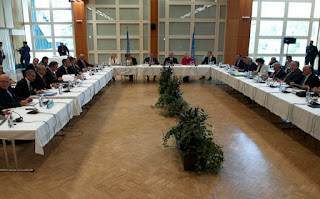The ongoing deterioration of relations between Greece and Turkey as evidenced by dogfights over the Aegean, overflights over inhabited and uninhabited Greek islands by the Turkish Air Force, illegal immigration and the postponement of the visit of the Greek Foreign Minister to Turkey has much to do with the different foreign policy perceptions in the two countries. The issue at hand is whether there can ever be a point of conjecture between the two approaches or the ongoing rapprochement between the two countries since 1999 is under threat. Although the Papoulias-Yilmaz Memorandum of Understanding (MoU) of 1988 calls for a moratorium of activity over the Aegean during the summer months, the only time it was fully implemented by the Turkish side was in the summer of 2004 (when Athens hosted the Olympic Games). What makes the current spate of activity over the Aegean a concern for Athens is the increased number of mock dogfights by armed aircraft (thereby increasing the possibility of accidents) and the systematic overflights over specific/targeted inhabited islands. On the other hand, the quick containment of a possible crisis over the island of Ro last week showed that the CBMS in place between the two sides can be effective.
From a Greek perspective, it seems inevitable that Turkey’s European Union (EU) journey is undoubtedly intertwined with bilateral relations between Greece and Turkey. While the EU Summits of December 2003 and December 2004 marked a turning point in Turkey’s relations with the EU, the pending issues of obligations on the part of the candidate state, the ever evolving acquis comunautaire and the absorption capacity of the EU will keep emerging and will have to be dealt with if the accession process is to come to a positive end. Hence, the EU will continue to be unwavering in its calls for Turkey’s international conduct to be in accordance with European standards and the principles and values of the Union. As such, this implies assuring the irreversibility of the political reform process and the full and comprehensive implementation of fundamental freedoms and full respects of human rights. The December 2004 decision also clearly calls for Turkey’s commitment to good-neighbourly relations and the settlement of outstanding border differences by political means in accordance with the United Nations Founding Charter, including possibly whenever necessary to have recourse to the International Court of Justice (ICJ). The EU has also been persistent in its demands for Turkey to allow the Customs Union to operate with all 27 current EU member states, including Cyprus by the end of this year.
Why is all of the above so important in terms of Greek-Turkish relations, you ask? From a Greek standpoint, the EU dimension has provided the opportunity to include the whole gamut of bilateral differences from both a legal and a political perspective within an EU framework. Whether we are talking about the Continental Shelf issue, which Greece considers to be the only legal difference between the two countries, or the status quo of the Aegean, the Ecumenical Patriarchate, the rights of the Greek minority and the resolution of the Cyprus issue, inter alia, Greece feels that Turkey’s EU accession negotiations have provided the relevant framework for resolution. After all, as a midsize EU member state, Greece in its differences with its neighbour and regional powerhouse, Turkey, has to depend on the diplomatic and legal tools provided by international law and the European Union. In fact, the issue of illegal immigration has of late come to the fore where Greece, whose islands have been inundated with illegal immigrants coming from the Turkish coast, has managed to mobilize EU support to weight on Turkey to implement bilateral agreements it has signed for the readmission of third party nationals that illegally enter other countries from its territory (the relevant accord with Greece dates back to 2001). Nevertheless, Greece has been and continues to be the most unwavering supporter of Turkey’s EU bid.
From the perspective of Athens, every time Turkey feels pressured to meet an obligation vis-à-vis the EU which is especially difficult to implement (such as the opening of airports and ports to Cypriot-flagged vessels by the end of 2009, or curbing illegal immigration to the EU), it ups the ante by increasing its activity in the Aegean whether through overflights or dogfights or by challenging the Greek position regarding the continental shelf by giving licenses for oil exploration in areas which Greece considers to be its territory. Turkey’s attempt and ability to project itself as a greater than regional power especially in today’s post-American world as a “stand alone” power seems to blur its commitment to be fully anchored into the European Union (where incidentally other great powers such as France, the UK and Germany promote both European standards, norms and values and seek a greater global role for themselves).
Thus, for Athens the question is whether Ankara can be fully anchored into the EU and be a great power simultaneously. To date, Athens has for the last decade been patiently waiting for Ankara to make up its mind about what it is and where it wants to go. If it cannot, then the question is whether the fact that Greece is the most steadfast promoter of Turkey’s EU accession process relevant at all in the context of Greek-Turkish relations? The concern stems from the fact that Greece’s Turkey policy since 1999 has been grounded to on a positive evolution of the Turkey-EU relationship. If Turkey’s tilt toward the lone wolf position becomes a permanent feature then the premise of Greece’s approach is furthered weakened. Hence, for Athens a major policy reevaluation may be in the offing -- sustaining rapprochement predicated upon the further evolution of EU-Turkish relations post-2009, the ability of the Union to become more cohesive and assertive as a global actor with the implementation of the Lisbon Treaty, and Ankara’s willingness to cooperate. Thus, the waiting game is bound to continue for some time.


Comments